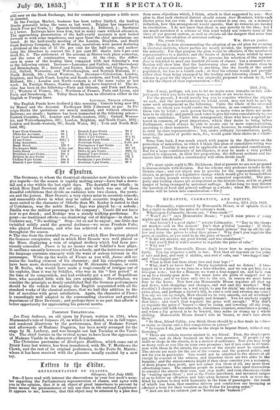Itttrro to tr Mot.
REPRESENTATION OF CLASSES.
Glasgow, 218t July 1863. Sea—I have read with interest the observations in your last week's num- ber regarding the Parliamentary representation of dames, and agree with you in the opinion, that it is an object of great importance to prevent by some means the predominance of any one class in the national Legislature. It appears to me, however, that this object may be attained by a plan free from some objections which, I think, attach to that suggested by you : that plan is, that each electoral district should return four Members, while each elector gives but one vote. It must be so evident to any one on a minute's reflection, how this arrangement would operate, that no remarks are needed in elucidation. I do not know that there is any novelty in the idea; but I am much mistaken if a scheme of this kind would not remove most of the vices of our present system, as well as obviate all the dangers that some fear would follow the adoption of universal suffrage. Sir, yours truly, WM. Govett junior.
[Mr. Govan is here recommending the adoption of an old plan for securing in electoral districts, where parties are nearly divided, the representation of the minority. For that purpose the plan would be effective, if the number of representatives to a district, and the limits of districts, were settled by men of skill and practical experience. We presume his selection of the number four is intended to meet our fourfold division of classes : but a moment's re- flection will show him that the landowning class and the literate class in very few places amount together to anything like the fourth of the adult population, far less to a fourth each ; so that his scheme would not prevent either class from being swamped by the trading and labouring classes. The scheme is good for the object it was originally proposed to attain by it, but not for the object of class representation.—En.]


























 Previous page
Previous page